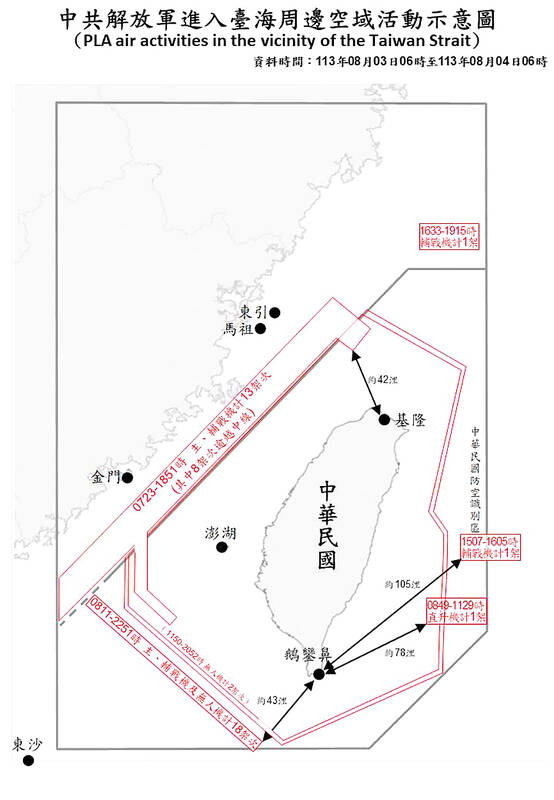Two sorties of Chinese drones were detected flying around the perimeter of Taiwan proper between 6am on Saturday and 6am yesterday, according to the Ministry of National Defense.
A total of 31 Chinese military aircraft — which included several drones — and 12 Chinese warships were detected operating in and near the Taiwan Strait over the 24-hour period, the ministry said.
Institute for National Defense and Security Research fellow Su Tzu-yun (蘇紫雲) said the maneuvers were likely aimed at affecting public sentiment in Taiwan, demonstrating defiance toward the US’ two-plus-two talks with India and Australia, and enacting China’s polarized strategy of pushing war and peace as two alternatives against Taiwan.

Photo courtesy of the Ministry of National Defense
Two of the drones had entered Taiwan’s air defense identification zone (ADIZ) from the northwest separately after 11:50am on Saturday, and then circled Taiwan proper, the ministry said.
Japan’s Ministry of Defense on Saturday also detected a Chinese drone flying in waters over the East China Sea between Taiwan and Yonaguni Island in Japan’s Okinawa Prefecture, before turning south toward the Bashi Channel, it said.
The Japanese ministry also detected a Shaanxi Y-9 electronic warfare aircraft flying over the East China Sea in airspace between Okinawa Island and Miyako Island in Okinawa Prefecture, it said.
Beijing frequently reacts to international cooperation in the region by holding drills in or near the Taiwan Strait, Su said.
Citing an example, he said that it had held drills following an announcement by Vietnam and the Philippines about planned joint naval exercises.
Beijing’s attitude toward Taiwan was also demonstrated on China’s People’s Liberation Army Day on Thursday last week, when it published through state media cartoons depicting attacks on Taiwanese cities including Taipei, Kaohsiung and Hualien, he said.
Separately, Democratic Progressive Party Legislator Wang Ting-yu (王定宇) yesterday said he believes that China’s recent military exercises near Taiwan were part of its cognitive warfare efforts, and were aimed at intimidating the Taiwanese public.
Taiwan should improve its defense capabilities and integrate international cooperation into its strategy to better prepare itself against Chinese threats, he said.
However, aggression from China would only result in democracies strengthening ties and cooperation, he said, adding that Taiwan would face any threat head-on.

Taiwan is to commence mass production of the Tien Kung (天弓, “Sky Bow”) III, IV and V missiles by the second quarter of this year if the legislature approves the government’s NT$1.25 trillion (US$39.78 billion) special defense budget, an official said yesterday. Commenting on condition of anonymity, a defense official with knowledge of the matter said that the advanced systems are expected to provide crucial capabilities against ballistic and cruise missiles for the proposed “T-Dome,” an advanced, multi-layered air defense network. The Tien Kung III is an air defense missile with a maximum interception altitude of 35km. The Tien Kung IV and V

The disruption of 941 flights in and out of Taiwan due to China’s large-scale military exercises was no accident, but rather the result of a “quasi-blockade” used to simulate creating the air and sea routes needed for an amphibious landing, a military expert said. The disruptions occurred on Tuesday and lasted about 10 hours as China conducted live-fire drills in the Taiwan Strait. The Civil Aviation Administration (CAA) said the exercises affected 857 international flights and 84 domestic flights, affecting more than 100,000 travelers. Su Tzu-yun (蘇紫雲), a research fellow at the government-sponsored Institute for National Defense and Security Research, said the air

A strong continental cold air mass is to bring pollutants to Taiwan from tomorrow, the Ministry of Environment said today, as it issued an “orange” air quality alert for most of the country. All of Taiwan except for Hualien and Taitung counties is to be under an “orange” air quality alert tomorrow, indicating air quality that is unhealthy for sensitive groups. In China, areas from Shandong to Shanghai have been enveloped in haze since Saturday, the ministry said in a news release. Yesterday, hourly concentrations of PM2.5 in these areas ranged from 65 to 160 micrograms per cubic meter (mg/m³), and pollutants were

Taiwan’s armed forces have established response protocols for a wide range of sudden contingencies, including the “Wan Chun Plan” to protect the head of state, the Ministry of Defense (MND) said today. After US President Donald Trump on Saturday launched a series of airstrikes in Venezuela and kidnapped Venezuelan President Nicolas Maduro, concerns have been raised as to whether China would launch a similar “decapitation strike” on Taiwan. The armed forces regularly coordinate with relevant agencies and practice drills to ensure preparedness for a wide range of scenarios, Vice Minister of National Defense Hsu Szu-chien (徐斯儉) told reporters before a